Saturday, March 20, 2021 11:21:55 PM
Vaccinating the Philippines could take two years. Health workers fear it will be a hotbed of variants by then
More than 85 poor countries will not have widespread access to coronavirus vaccines before 2023
"Most poor nations 'will take until 2024 to achieve mass Covid-19 immunisation'"
By South-East Asia correspondent Anne Barker
Posted 7h ago, updated 2h ago

Dr Genalyne Maroon-Berzabal, a paediatrician in Manila, was anxious to get her vaccine. (ABC News: Jayson Pajarillo)
As a frontline health worker, Dr Genalyne Maroon-Berzabal has witnessed firsthand the latest surge in COVID-19 infections in the Philippines.
The young doctor runs a paediatric clinic in Manila but, when the pandemic hit a year ago, she began working with coronavirus patients at a government hospital in the city, where case numbers are skyrocketing.
"The past few days, hospital admissions are climbing," she said.
"Some of the hospitals are at full capacity."
After an anxious wait, Dr Maroon-Berzabal finally received her COVID-19 vaccine, which she hopes will protect her as she fights the new surge in cases.
But she is one of the lucky ones. The slow delivery and rollout of vaccines across the Philippines means many other health workers have to wait weeks or months for their turns.
So far the country has received barely enough vaccines for 1 per cent of the population. At the current rate, the nation won't be vaccinated until 2023.
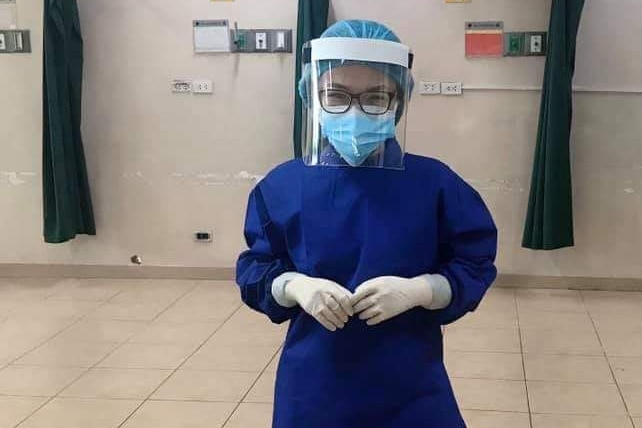
So far the Philippines has received enough vaccine for 1 per cent of its population.
Dr Genalyne Maroon-Berzabal was one of the lucky ones.
(Supplied: Genalyne Maroon-Berzabal)
"The supply is extremely small, we all need to vaccinate as soon as possible to save our lives," Dr Maroon-Berzabal said.
And as the Philippines launches its mass immunisation program, there are worrying signs that several new and faster-spreading strains of the virus are fuelling a huge new wave of infections.
In the past month, the Philippines has recorded hundreds of cases of the B.1.1.7 variant first detected in the UK, and 152 cases of the B.1.351 strain discovered in South Africa.
"There's a new monster again," Philippines President Rodrigo Duterte warned of the UK variant.
"I pray to God really that this won't be more dangerous, more toxic than the original COVID."
Just last week, the country confirmed its first case of the P.1 Brazil variant.
------
[Insert: Will Delaying Vaccine Doses Cause a Coronavirus Escape Mutant?
[...]
Crucially, virologists and immunologists don’t yet know exactly what sort of environment would be most likely to prompt a SARS-CoV-2 escape variant to evolve—in other words, what level of suboptimal immune response equates to the highest risk of the virus evolving a successful escape variant. There are thousands of SARS-CoV-2 variants .. https://www.cogconsortium.uk/news_item/update-on-new-sars-cov-2-variant-and-how-cog-uk-tracks-emerging-mutations/ .. known to be in circulation around the world, but just a few of them are thought to be noticeably more transmissible .. https://www.the-scientist.com/multimedia/side-by-side-comparisons-of-important-sars-cov-2-variants-68388 . They could be thought of as partial escape variants, suggests Meyer, because they are less susceptible to neutralization by antibodies but are not thought to evade the broader immune response. Nobody knows what conditions allowed for the emergence of these variants in the first place.
P - Past vaccine escape mutants
P - In general, vaccine resistance among pathogens is rare. Famously, vaccines have succeeded in keeping the highly infectious measles virus at bay since the inoculations were first introduced in the 1960s. And Meyer notes that, while influenza viruses are known to mutate rapidly, their many variants are not generally thought to have evolved as a result of vaccination programs.
https://investorshub.advfn.com/boards/read_msg.aspx?message_id=162636730]
------
Scientists believe they have now discovered a Philippines strain, known as P3 .. https://www.medrxiv.org/content/10.1101/2021.03.03.21252812v2 , in the Central Visayas region.
The new local variant has been "linked to possible increased transmissibility and immune escape in some studies," according to the UP Philippine Genome Centre .. https://pgc.up.edu.ph/sars-cov-2-bulletin-no-7/ .
It is a stark example of the dangers that lower-income nations face, well behind in the global vaccine queue but still vulnerable to the ravages of more infectious strains.
Daily known new cases since 100th case
Coronavirus cases in the Philippines have soared to 656,056, and almost 13,000 deaths — the second-highest death toll in South-East Asia.
The past few days alone have seen an additional 20,000 new cases.
If tougher measures are not introduced to curtail the spread, health researchers are now warning that these more-infectious strains of COVID-19 could see daily infections across the country double to 11,000 by the end of March.
'It's spreading'
Dr Guido David, from the OCTA Research group at the University of the Philippines, said the virus reproduction number — or the number of people infected by a single COVID-19 patient — has risen to 2.03.
At that rate, the virus would spread exponentially if measures were not implemented to bring it down.
Read more about coronavirus:
* All Australians over 70 can now book a COVID vaccine
https://www.abc.net.au/news/2021-03-11/who-declared-coronavirus-a-pandemic-one-year-ago/13236894
* Fears of a "catastrophe" as PNG struggles to cope with rising CIVD cases
https://www.abc.net.au/news/2021-03-11/png-catastrophe-coronavirus-health-system-vaccine-covid-19/13239246
The worst outbreak has been in the capital region, including Manila which, with 13 million people, is the most densely populated city in the world.
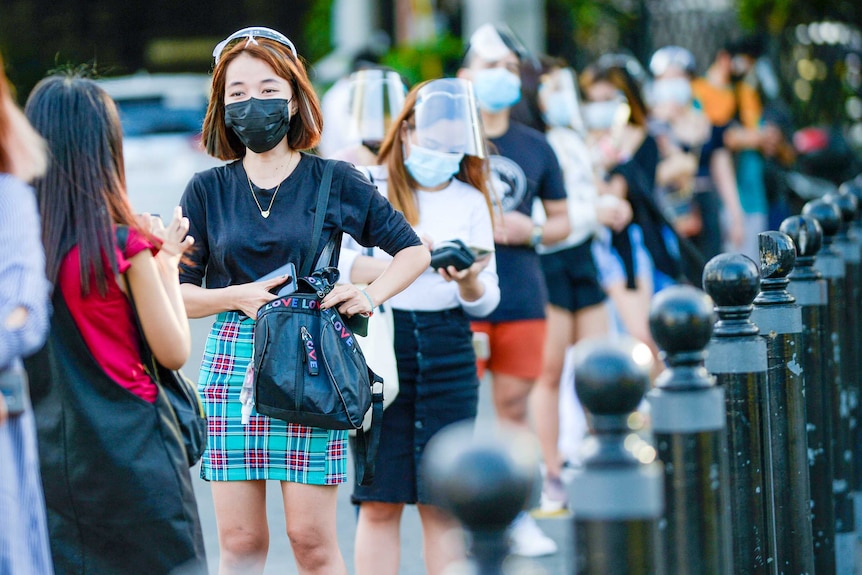
The worst outbreak in the Philippines is occurring in Manila, the most densely populated city in the world.
(Reuters: Lisa Marie David)
Government authorities have blamed public complacency towards safety measures for the surge in COVID-19 cases.
But critics have blamed the government for failing to do more to contain the pandemic, while also relaxing restrictions to allow people to go out or back to work in an attempt to revive the economy.
Dr David said the new, faster-spreading strains of the virus are also a major factor.
"It's spreading more quickly," he said.
-
"We're also seeing an increase in the number of paediatric cases, of children being infected
with these new variants. This is not something that we saw previously."
-
He said health workers are seeing infections rip through entire families.
"We're not necessarily seeing an increase in the severity of the infection ... the number of severe and critical cases. But what we are seeing is that there are more infections, especially with children," he said.
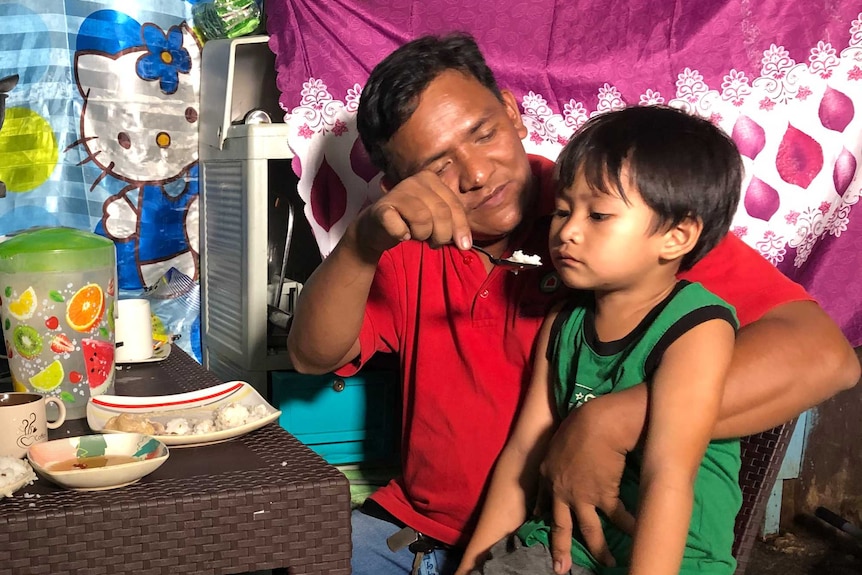
Florentino Jadion must drive a taxi to keep his family afloat, but he's terrified of bringing home COVID-19 and
spreading it to his children. (ABC News: Jayson Pajarillo)
The surge in family infections is a worry for Manila taxi driver Florentino Jadion, who has five children, one of them with serious health issues.
He currently works around 15 hours a day to provide for his wife and children and worries he could catch the virus and bring it home.
"No matter how careful I am, I could get it from my passengers when I handle their payments or money," Mr Jadion said.
"That is why I want to be vaccinated immediately for my safety and for my family."
Filipinos are desperate for the vaccine
The growing crisis only underlines the shortage of vaccines in the Philippines. It is one of the last countries in South-East Asia to begin inoculating its population.
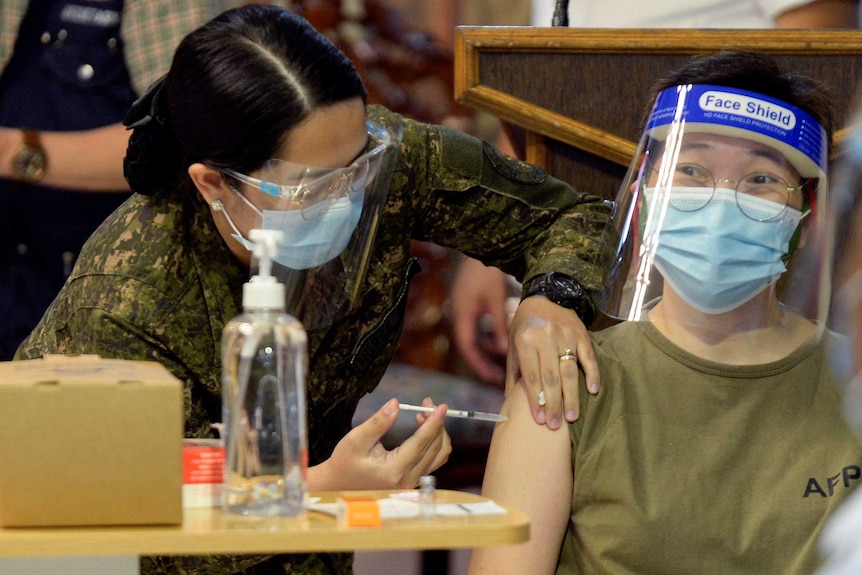
The Philippines currently only has enough vaccine supplies for 1 per cent of its population. (Reuters: Lisa Marie David)
A national vaccination program officially began on March 1, but the Philippines still has only a tiny fraction of the 150 million or more doses needed to achieve herd immunity by the end of the year, in a country of 108 million people.
The Philippines has so far received only 1.1 million doses, including 600,000 doses of the Sinovac vaccine donated from China, and 525,600 doses of AstraZeneca under the COVAX program, designed to ensure poorer countries have access to vaccines.
Deliveries of the Pfizer, Moderna and Novavax vaccines are on order, but could take months to arrive in the country.
Read more about COVID-19 vaccines:
* The 'concerning' divide in Australians' attitudes to vaccines
https://www.abc.net.au/news/2021-03-05/australia-covid-vaccine-survey/13203170
* Pausing AstraZeneca rollout an "overreaction", experts say
https://www.abc.net.au/news/2021-03-12/why-the-eu-has-halted-astrazeneca-rollout-due-to-blood-clots/13241462
* Tracking Australia's COVID vaccine rollout
https://www.abc.net.au/news/2021-03-02/charting-australias-covid-vaccine-rollout/13197518
Philippine authorities have struggled to conclude deals with numerous other vaccine makers in the face of competition from richer nations.
"Some of the wealthier nations get first priority," Dr David said.
"Some countries have secured more than what they need. And right now the Philippines definitely has not secured enough for our needs."
The surge in infections, along with the slow rollout of vaccines, has sparked fears of another prolonged lockdown as the only way to contain the latest outbreak.
Another lockdown strikes fear in Filipinos
The Philippines already endured one of the world's longest and hardest lockdowns last year when the pandemic first began .. https://www.abc.net.au/news/2020-04-29/philippines-social-volcano-threatening-to-erupt-amid-covid-19/12193188 , forcing people to stay at home for months, closing shops and businesses and restricting foreign travel.
[That would account for their relatively low number of deaths. Relative to Trump's America, for one.]
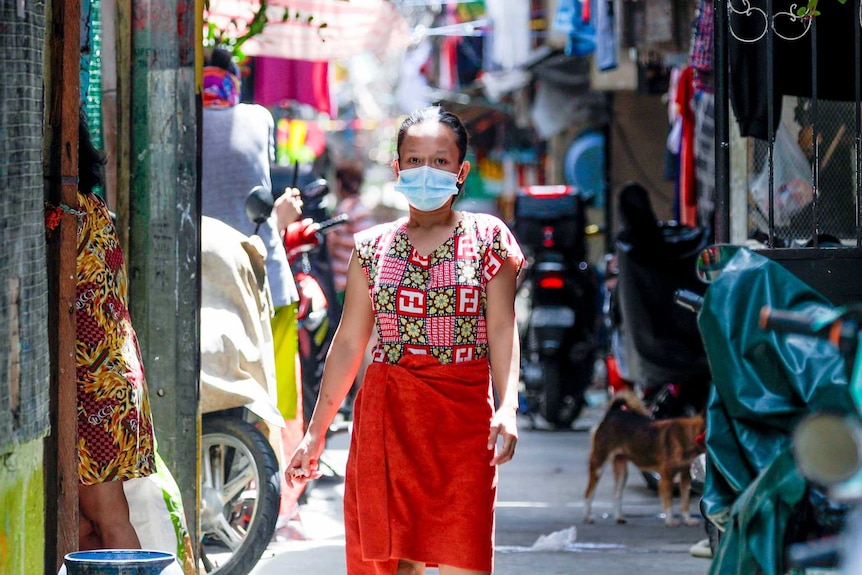
The Philippines government says a wider, stricter lockdown may be enforced if cases keep creeping up.
(AP: Aaron Favila)
Last week, authorities imposed a new ban on foreigners and some citizens entering the country until late April. Several villages in the capital region have gone into lockdown, while others have imposed a nightly curfew to last two weeks.
The government this week warned a wider lockdown cannot be ruled out despite the impact it would have on the lives of Filipinos.
The Philippines economy suffered a record downturn in 2020 because of the pandemic.
Zaldy Mundero, 58, has relied on his jeepney, a typical open-style bus in Manila, to make a living for the past two decades.
In good times he used to earn a decent living. But the harsh lockdown last year meant he was effectively banned from taking passengers for at least four months and he struggled to survive.

Zaldy Mundero fears the virus, but says another tough lockdown could leave him and his family destitute.
(ABC News: Jayson Pajarillo)
A second lockdown, he says, would be devastating.
"It was difficult to find work, or food for me and my children," he said.
-
"Sometimes I had to borrow money from my cousin. I would ask for money to buy food. If
another lockdown happens, we won't have anything more to eat."
-
https://www.abc.net.au/news/2021-03-21/philippines-fears-third-wave-of-coronavirus-as-vaccine-stalls/13250372
More than 85 poor countries will not have widespread access to coronavirus vaccines before 2023
"Most poor nations 'will take until 2024 to achieve mass Covid-19 immunisation'"
By South-East Asia correspondent Anne Barker
Posted 7h ago, updated 2h ago
Dr Genalyne Maroon-Berzabal, a paediatrician in Manila, was anxious to get her vaccine. (ABC News: Jayson Pajarillo)
As a frontline health worker, Dr Genalyne Maroon-Berzabal has witnessed firsthand the latest surge in COVID-19 infections in the Philippines.
The young doctor runs a paediatric clinic in Manila but, when the pandemic hit a year ago, she began working with coronavirus patients at a government hospital in the city, where case numbers are skyrocketing.
"The past few days, hospital admissions are climbing," she said.
"Some of the hospitals are at full capacity."
After an anxious wait, Dr Maroon-Berzabal finally received her COVID-19 vaccine, which she hopes will protect her as she fights the new surge in cases.
But she is one of the lucky ones. The slow delivery and rollout of vaccines across the Philippines means many other health workers have to wait weeks or months for their turns.
So far the country has received barely enough vaccines for 1 per cent of the population. At the current rate, the nation won't be vaccinated until 2023.
So far the Philippines has received enough vaccine for 1 per cent of its population.
Dr Genalyne Maroon-Berzabal was one of the lucky ones.
(Supplied: Genalyne Maroon-Berzabal)
"The supply is extremely small, we all need to vaccinate as soon as possible to save our lives," Dr Maroon-Berzabal said.
And as the Philippines launches its mass immunisation program, there are worrying signs that several new and faster-spreading strains of the virus are fuelling a huge new wave of infections.
In the past month, the Philippines has recorded hundreds of cases of the B.1.1.7 variant first detected in the UK, and 152 cases of the B.1.351 strain discovered in South Africa.
"There's a new monster again," Philippines President Rodrigo Duterte warned of the UK variant.
"I pray to God really that this won't be more dangerous, more toxic than the original COVID."
Just last week, the country confirmed its first case of the P.1 Brazil variant.
------
[Insert: Will Delaying Vaccine Doses Cause a Coronavirus Escape Mutant?
[...]
Crucially, virologists and immunologists don’t yet know exactly what sort of environment would be most likely to prompt a SARS-CoV-2 escape variant to evolve—in other words, what level of suboptimal immune response equates to the highest risk of the virus evolving a successful escape variant. There are thousands of SARS-CoV-2 variants .. https://www.cogconsortium.uk/news_item/update-on-new-sars-cov-2-variant-and-how-cog-uk-tracks-emerging-mutations/ .. known to be in circulation around the world, but just a few of them are thought to be noticeably more transmissible .. https://www.the-scientist.com/multimedia/side-by-side-comparisons-of-important-sars-cov-2-variants-68388 . They could be thought of as partial escape variants, suggests Meyer, because they are less susceptible to neutralization by antibodies but are not thought to evade the broader immune response. Nobody knows what conditions allowed for the emergence of these variants in the first place.
P - Past vaccine escape mutants
P - In general, vaccine resistance among pathogens is rare. Famously, vaccines have succeeded in keeping the highly infectious measles virus at bay since the inoculations were first introduced in the 1960s. And Meyer notes that, while influenza viruses are known to mutate rapidly, their many variants are not generally thought to have evolved as a result of vaccination programs.
https://investorshub.advfn.com/boards/read_msg.aspx?message_id=162636730]
------
Scientists believe they have now discovered a Philippines strain, known as P3 .. https://www.medrxiv.org/content/10.1101/2021.03.03.21252812v2 , in the Central Visayas region.
The new local variant has been "linked to possible increased transmissibility and immune escape in some studies," according to the UP Philippine Genome Centre .. https://pgc.up.edu.ph/sars-cov-2-bulletin-no-7/ .
It is a stark example of the dangers that lower-income nations face, well behind in the global vaccine queue but still vulnerable to the ravages of more infectious strains.
Daily known new cases since 100th case
Coronavirus cases in the Philippines have soared to 656,056, and almost 13,000 deaths — the second-highest death toll in South-East Asia.
The past few days alone have seen an additional 20,000 new cases.
If tougher measures are not introduced to curtail the spread, health researchers are now warning that these more-infectious strains of COVID-19 could see daily infections across the country double to 11,000 by the end of March.
'It's spreading'
Dr Guido David, from the OCTA Research group at the University of the Philippines, said the virus reproduction number — or the number of people infected by a single COVID-19 patient — has risen to 2.03.
At that rate, the virus would spread exponentially if measures were not implemented to bring it down.
Read more about coronavirus:
* All Australians over 70 can now book a COVID vaccine
https://www.abc.net.au/news/2021-03-11/who-declared-coronavirus-a-pandemic-one-year-ago/13236894
* Fears of a "catastrophe" as PNG struggles to cope with rising CIVD cases
https://www.abc.net.au/news/2021-03-11/png-catastrophe-coronavirus-health-system-vaccine-covid-19/13239246
The worst outbreak has been in the capital region, including Manila which, with 13 million people, is the most densely populated city in the world.
The worst outbreak in the Philippines is occurring in Manila, the most densely populated city in the world.
(Reuters: Lisa Marie David)
Government authorities have blamed public complacency towards safety measures for the surge in COVID-19 cases.
But critics have blamed the government for failing to do more to contain the pandemic, while also relaxing restrictions to allow people to go out or back to work in an attempt to revive the economy.
Dr David said the new, faster-spreading strains of the virus are also a major factor.
"It's spreading more quickly," he said.
-
"We're also seeing an increase in the number of paediatric cases, of children being infected
with these new variants. This is not something that we saw previously."
-
He said health workers are seeing infections rip through entire families.
"We're not necessarily seeing an increase in the severity of the infection ... the number of severe and critical cases. But what we are seeing is that there are more infections, especially with children," he said.
Florentino Jadion must drive a taxi to keep his family afloat, but he's terrified of bringing home COVID-19 and
spreading it to his children. (ABC News: Jayson Pajarillo)
The surge in family infections is a worry for Manila taxi driver Florentino Jadion, who has five children, one of them with serious health issues.
He currently works around 15 hours a day to provide for his wife and children and worries he could catch the virus and bring it home.
"No matter how careful I am, I could get it from my passengers when I handle their payments or money," Mr Jadion said.
"That is why I want to be vaccinated immediately for my safety and for my family."
Filipinos are desperate for the vaccine
The growing crisis only underlines the shortage of vaccines in the Philippines. It is one of the last countries in South-East Asia to begin inoculating its population.
The Philippines currently only has enough vaccine supplies for 1 per cent of its population. (Reuters: Lisa Marie David)
A national vaccination program officially began on March 1, but the Philippines still has only a tiny fraction of the 150 million or more doses needed to achieve herd immunity by the end of the year, in a country of 108 million people.
The Philippines has so far received only 1.1 million doses, including 600,000 doses of the Sinovac vaccine donated from China, and 525,600 doses of AstraZeneca under the COVAX program, designed to ensure poorer countries have access to vaccines.
Deliveries of the Pfizer, Moderna and Novavax vaccines are on order, but could take months to arrive in the country.
Read more about COVID-19 vaccines:
* The 'concerning' divide in Australians' attitudes to vaccines
https://www.abc.net.au/news/2021-03-05/australia-covid-vaccine-survey/13203170
* Pausing AstraZeneca rollout an "overreaction", experts say
https://www.abc.net.au/news/2021-03-12/why-the-eu-has-halted-astrazeneca-rollout-due-to-blood-clots/13241462
* Tracking Australia's COVID vaccine rollout
https://www.abc.net.au/news/2021-03-02/charting-australias-covid-vaccine-rollout/13197518
Philippine authorities have struggled to conclude deals with numerous other vaccine makers in the face of competition from richer nations.
"Some of the wealthier nations get first priority," Dr David said.
"Some countries have secured more than what they need. And right now the Philippines definitely has not secured enough for our needs."
The surge in infections, along with the slow rollout of vaccines, has sparked fears of another prolonged lockdown as the only way to contain the latest outbreak.
Another lockdown strikes fear in Filipinos
The Philippines already endured one of the world's longest and hardest lockdowns last year when the pandemic first began .. https://www.abc.net.au/news/2020-04-29/philippines-social-volcano-threatening-to-erupt-amid-covid-19/12193188 , forcing people to stay at home for months, closing shops and businesses and restricting foreign travel.
[That would account for their relatively low number of deaths. Relative to Trump's America, for one.]
The Philippines government says a wider, stricter lockdown may be enforced if cases keep creeping up.
(AP: Aaron Favila)
Last week, authorities imposed a new ban on foreigners and some citizens entering the country until late April. Several villages in the capital region have gone into lockdown, while others have imposed a nightly curfew to last two weeks.
The government this week warned a wider lockdown cannot be ruled out despite the impact it would have on the lives of Filipinos.
The Philippines economy suffered a record downturn in 2020 because of the pandemic.
Zaldy Mundero, 58, has relied on his jeepney, a typical open-style bus in Manila, to make a living for the past two decades.
In good times he used to earn a decent living. But the harsh lockdown last year meant he was effectively banned from taking passengers for at least four months and he struggled to survive.
Zaldy Mundero fears the virus, but says another tough lockdown could leave him and his family destitute.
(ABC News: Jayson Pajarillo)
A second lockdown, he says, would be devastating.
"It was difficult to find work, or food for me and my children," he said.
-
"Sometimes I had to borrow money from my cousin. I would ask for money to buy food. If
another lockdown happens, we won't have anything more to eat."
-
https://www.abc.net.au/news/2021-03-21/philippines-fears-third-wave-of-coronavirus-as-vaccine-stalls/13250372
It was Plato who said, “He, O men, is the wisest, who like Socrates, knows that his wisdom is in truth worth nothing”
Join the InvestorsHub Community
Register for free to join our community of investors and share your ideas. You will also get access to streaming quotes, interactive charts, trades, portfolio, live options flow and more tools.










